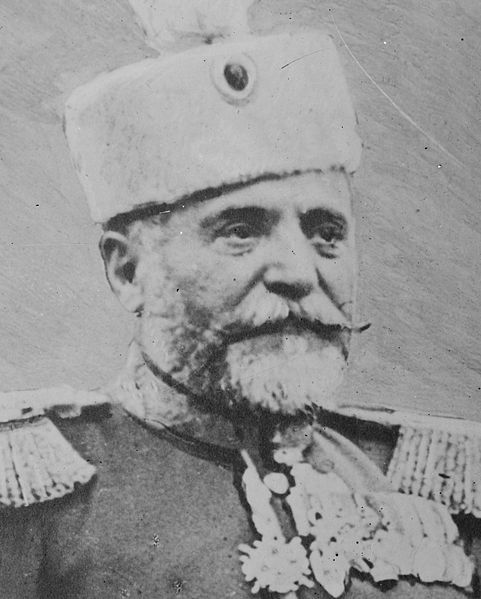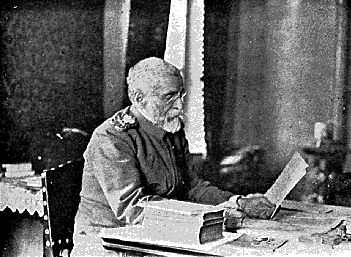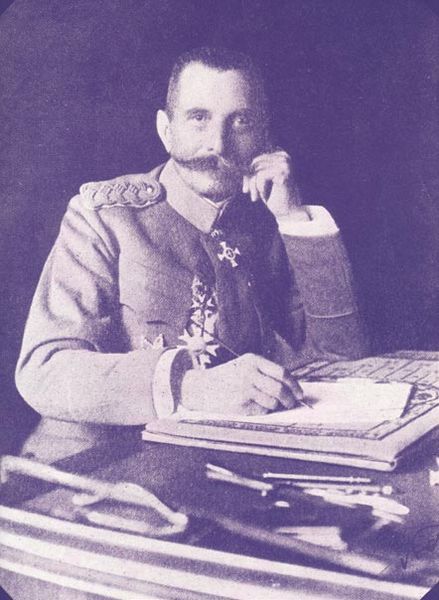<Back to Index>
- Chief of the General Staff of the Serbian Army Radomir Putnik, 1847
- Vojvoda of the Serbian Army and Chief of the General Staff of the Yugoslav Royal Army Petar Bojović, 1858
PAGE SPONSOR


Radomir Putnik, also known as Vojvoda Putnik, (Serbian: Радомир Путник, Војвода Путник; 24 January 1847 – 17 May 1917) was a Serbian Vojvoda and Chief of the General Staff of the Serbian army in the Balkan Wars and in the First World War. He took part in all of the wars that Serbia waged from 1876 to 1917.
In the mid 19th century, Putnik's family returned from exile in Austria - Hungary to liberated Serbia. Putnik's father, Dimitrije, was a teacher in Kragujevac, and Radomir completed his basic schooling there. He attended the Artillery School (the precursor to what would eventually become the Military Academy) in Belgrade, from where he graduated in 1863, placing eighth in his class. In 1879, he married Ljubica Bojović, the daughter of a colonel, with whom he had seven children (three daughters and four sons). Contemporaries describe him as an ascetic, introverted man, and a heavy smoker; however, he is also thought to have been tough on professional issues. He proved himself on the battlefield during Serbia's wars against the Ottomans that were fought between 1876 and 1877. On several occasions, he was severely reprimanded and even briefly put in custody for using "inappropriate language" when addressing senior officers.
He became a professor in the Military Academy, holding that position from 1886 to 1895. In 1889, he was appointed the Deputy Chief of the General Staff. However, he soon came into conflict with King Milan I, partly for not allowing a King's protégé to pass an examination. Political intrigue and latent conflict with King Milan and his successor, King Alexander I, would follow him throughout this part of his career. In 1895, he was forced to retire by the King.
After a military coup d'etat (executed by what would later become unofficially called the Black Hand organization) against Alexander I in 1903, Putnik was rehabilitated, promoted to the rank of General and was appointed the Chief of the General Staff. He then proceeded to completely reorganize the army by retiring old and promoting new officers, and updating outdated war plans. He appointed General Živojin Mišić as his deputy. Despite occasional personality clashes, the two men had deep respect for each other. Putnik was the first officer to be appointed to the highest rank of vojvoda (Field Marshal). In 1912, he led the Serbian Army into victories in the First and Second Balkan Wars. During that period, he was also Serbian Minister of War on several occasions.
Caught in Budapest when Austria - Hungary declared war upon his country, Putnik was allowed safe passage back to Serbia in a chivalrous and possibly self defeating gesture by the Austro - Hungarian emperor Franz Josef. After a troublesome trip, Putnik returned to Serbia and offered his resignation to King Peter I of Serbia on the grounds of ill health. It was rejected, the King insisting that Putnik take command over the army, if only in a strategic sense, while younger generals would take over operational duties. Putnik had to spend most of his time in a well heated room. However, his impaired health did not prevent him from successfully organizing the campaign. Serbia repulsed the Austrian Army's offensives in August and September 1914, driving it out of Serbia by December.
The Serbian front remained relatively quiet until Autumn 1915, when Austro - Hungarian, German and Bulgarian forces, led by Field Marshal August von Mackensen, began a large offensive against Serbia with more than 300,000 soldiers. On 31 October, Putnik ordered a general retreat onto Kragujevac, attempting to keep his exhausted army together as it sought an escape into friendly territory. Many of Putnik's soldiers were farmers, who slipped away from the retiring army to resume their rural lives. Putnik's rapidly declining forces continued their withdrawal towards Albania during the first week of November 1915, a process aided by the fact that the Germans, Bulgarians and Austro - Hungarians began to lose interest in prosecuting the campaign any further. The Germans felt that the war against Serbia was won, with most of the nation under the control of the Central Powers. Regarding the Russian Empire as the main threat in the East, Mackensen was eager to move his forces back to the Russian front. The Bulgarians were more than happy with their territorial gains in Macedonia and northwest Serbia, while the Austro - Hungarians were equally content with the notion that the Bulgarians were not moving to establish a Greater Bulgaria. The final confrontation occurred in Kosovo, the Field of the Blackbirds, between 19 and 24 November 1915. The Serbs were afflicted by a new outbreak of typhus, while food and ammunition was in extremely short supply. Defeat was inevitable. On 25 November, Putnik made his last and most painful order — full retreat, southwards and westwards through Montenegro and into Albania, trying to reach allied ships that would, he hoped, transport the core of the army to the safety of the Ionian islands. Many of the fleeing soldiers and civilians did not make it to the coast, though - they were lost to hunger, disease, attacks by enemy forces and Albanian tribal bands. The circumstances of the retreat were disastrous, and all told, some 155,000 Serbs, mostly soldiers, reached the coast of the Adriatic Sea, and embarked on Allied transport ships that carried the army to various Greek islands (many to Corfu) before being sent to Salonika. In worsening health, Putnik had to be carried in a sedan chair during the retreat, exhausted by the effort and episodes of bronchitis, influenza and pneumonia. Putnik was taken over by allied forces in Skadar and transported to Brindisi, and then to Corfu along with the core of the army.
In the atmosphere of recrimination that followed between the government and the High Command, the entire General Staff was dismissed in January 1916, including Putnik. He felt embittered, having learned of his dismissal from a cashier who gave him his salary without a Chief of General Staff's supplement. He traveled to Nice, where French authorities welcomed him with honors and gave him a villa. He was overcome by lung emphysema and died on 17 May 1917, without seeing his homeland again. His remains were transferred to Serbia in 1926 and buried with honors in a chapel at Belgrade's New Cemetery. The grave carries the epitaph "Grateful Homeland to Radomir Putnik". Mount Putnik in Canada is named after him.
| “ | Troop concentration on paper is a quick and easy matter. | ” |
- Ironic remark in a letter to Andra Knićanin on the movements of the Serbian army across very difficult terrain at the beginning of the Serbo - Turkish war of 1878.
| “ | Those were only skirmishes with Turkish rearguards. | ” |
- Upon first hearing of the Battle of Kumanovo - The Serbian High Command expected that a decisive battle with the Ottoman forces has yet to take place - most likely on Ovče Polje plateau just north of Skopje. Also, due to communication problems, it first heard of the battle when it had already been won.

Petar Bojović (Serbian: Петар Бојовић; July 16, 1858, Miševići, Nova Varoš - January 20, 1945, Belgrade) was one of four Serbian vojvodas in Balkan Wars and World War I.
Petar was born on July 16, 1858 in Miševići, Nova Varoš. He had distant ancestry from the Vasojevići.
He fought in Serbian - Ottoman Wars from 1876 to 1878 as a cadet of the Artillery school, as well as in wars that Serbia waged at the beginning of the 20th century. He was Chief of the General Staff for the first time from 1905 to 1908.
In the Balkan Wars, he was the Chief of Staff of the 1st Army, which scored huge successes in the battles of Kumanovo, Bitola (First Balkan War) and Bregalnica (Second Balkan War). He took part in peace negotiations with Turkey, held in London in 1913, as a military expert in the Serbian Government delegation.
At the start of World War I, he was given command of the 1st Army. His army suffered huge losses at Battle of Drina, but managed to stop the Austro - Hungarian offensive. Bojović was wounded in the battle, and was replaced at the army general position by Živojin Mišić. In January 1916, he was appointed Chief of General Staff for a second time in place of the ailing vojvoda Radomir Putnik, who was carried by his soldiers to the city of Skadar. He held that position until June 1918, when he resigned because of a dispute with the allied generals on the issue of widening the Thessaloniki Front. He returned to his position as Commander of the 1st Army, which broke the enemy lines and advanced deep into the occupied territory. He received the title of vojvoda on September 26, 1918 for his contributions during the war.
In 1921, he was appointed Chief of the General Staff of the Yugoslav Army, and in 1922 he withdrew from active service. At the very beginning of World War II, Petar Bojovic was appointed Assistant to the Commander - in - Chief of the Yugoslavian Armed Forces, the young King Petar II Karađorđević. However, because of his old age, he did not participate in the events that followed.